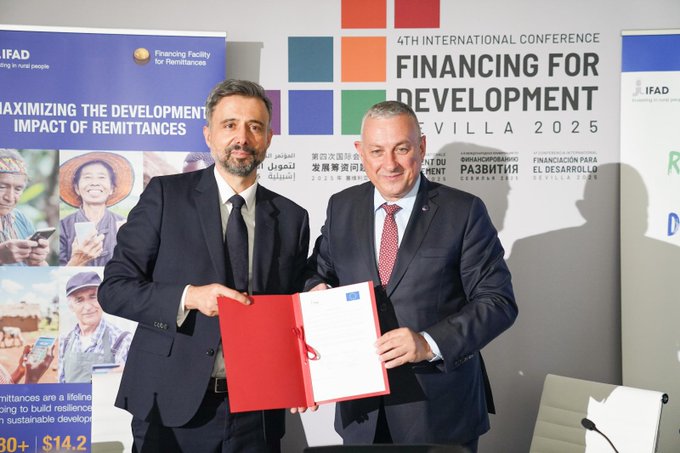30 June – 3 July 2025. Seville, Spain. Fourth International Conference on Financing for Development (FfD4)
30 June 2025. Seville. From FfD4 Commitments to Actions: Maximizing Remittances and Diaspora Investments towards Financing Development
 This side-event provided a platform to reflect on the growing recognition of remittances and diaspora investment to sustainable development in countries of origin. With global remittance flows to low- and middle-income countries (LMICs) surpassing US$685 billion in 2024, exceeding foreign direct investment and over three times the volume of official development assistance, these private financial flows have become indispensable in the global financing landscape, particularly in rural areas where poverty and vulnerability are most concentrated.
This side-event provided a platform to reflect on the growing recognition of remittances and diaspora investment to sustainable development in countries of origin. With global remittance flows to low- and middle-income countries (LMICs) surpassing US$685 billion in 2024, exceeding foreign direct investment and over three times the volume of official development assistance, these private financial flows have become indispensable in the global financing landscape, particularly in rural areas where poverty and vulnerability are most concentrated.Ministers and high-level representatives from IFAD, the European Commission, Italy, Spain, Guatemala, the Philippines and Senegal shared their national experiences and forward-looking actions to mobilize and maximize the impact of remittances and diaspora investment. The session also showcased concrete commitments aligned with FfD4 outcomes, including the signing of a new partnership agreement between IFAD and the EU focused on diaspora investment, financial inclusion and climate resilience.The session “Game Changers: Role of Remittances & Diaspora Contributions” explored how remittances and diaspora investments have emerged as transformative forces in global development, far surpassing traditional financing mechanisms like ODA (Official Development Assistance) and FDI (Foreign Direct Investment).
- Ms. Faith Kobusingye Mugambwa, Programme Coordinator, Umurenge SACCO Automation & Consolidation Project, Ministry of Finance & Economic Planning, Rwanda
- Ms. Lanto RAHAJARIZAFY, Director General for Development Partnership & the Diaspora, Ministry of Foreign Affairs, Madagascar
- Mr. Muyangwa Muyangwa, Director General, National Pension Scheme Authority (NAPSA), Zambia
- Mr. Jaona Ravaloson, Head of Mission, Meso Capital Madagascar Funds
Beyond remittances, migrants also invest back home and contribute substantial human and financial capital in the form of skills and networks into their countries of origin.Key Themes and Focus Areas
- Recognition of Growth & Scale: In 2024, remittance flows to low- and middle-income countries (LMICs) reached a staggering US $685 billion, outweighing FDI (~US $435 billion) and tripling ODA (~US $211 billion) feps-europe.eu+3linkedin.com+3ffremittances.org+3.
- Policy Commitments: Discussions were anchored in the draft outcome document of FfD4, “Compromiso de Sevilla”, which urged governments to: reduce remittance fees (targeting < 3% by 2030), promote digital remittance channels., improve financial inclusion and literacy (especially in rural areas), encourage diaspora investment.
- Showcasing national experiences (e.g., Spain, Italy, Guatemala, the Philippines, Senegal).
- Highlighting the EU–IFAD partnership on diaspora investment and climate resilience.
- From Commitments to Action. Emphasis on converting high-level pledges into concrete initiatives across digital finance, diaspora engagement, and rural development. ffremittances.org
30 June 2025. Unlocking, Scaling, and Repurposing Finance for Food Systems Transformation: The Strategic Role of International Financial Institutions (IFIs)
1 July 2025. Harnessing remittances and diaspora investment as innovative financing for development
- Amy Pope. IOM Director General
- H.E. Bihi Iman Egeh, Minister of Finance, Somalia
- Latest global remittance data: Dilip Ratha, Lead Economist, Migration and Remittances, MIGA, World Bank (online)
- Reducing remittances costs UK to East Africa: Killian Clifford, Remittances, diaspora investment and development finance lead, IOM
- Killian Clifford, IOM (moderator)
- Louise Walker, Head of Private Sector and Capital Markets Department, FCDO
- Prof. Gibril Faal, OBE, Director - GK Partners, LSE visiting professor, UK
- José Filomeno de Carvalho Dias Monteiro, Minister of Foreign Affairs, Cooperation and Regional Integration and Minister for Communities, Cabo Verde (tbc)
2 July 2025. Investing in the Future: Financing School Feeding as a Cornerstone for Ending
Hunger, Building Resilience and Promoting Development
 She gave an interview at casa devex about the initiatives of Foodbridge. At the school feeding side event she stressed:
She gave an interview at casa devex about the initiatives of Foodbridge. At the school feeding side event she stressed:- the need to include indigenous food crops in school feeding programmes
- the importance of spending some of the budget for infrastructure on school farms
- the support to agricultural undergraduates to ensure sustainability even if the funding stops.
"One of the highlights of attending events like FfD4 is the chance to meet with inspiring individuals and motivated sector leaders; especially those who may not know how their work benefits small organizations that aren’t always visible. It was a pleasure to meet Mr. Jean Van Wetter , CEO of Enabel and also have a conversation. My colleagues and I informed him of the relevance of our roles as African diaspora development actors." Maureen Duru of Foodbridge
2 July 2025. From FfD4 Commitments to Action: Unlocking Partnerships between IFIs and NDBs to Increase Agri‑Financing for Rural Transformation.
This high-level event convened by IFAD, the African Development Bank (AfDB), and the European Investment Bank (EIB) shed a spotlight on a key missing link: scaling up collaboration between International Financial Institutions (IFIs) and National Development Banks (NDBs) to drive investment in agriculture and rural transformation.
The session highlighted how these partnerships can unlock long-term, low-cost financing for country-level priorities, particularly in food systems, where NDBs play a pivotal role as domestic investors. With a focus on concrete examples and lessons from IFAD’s Agri PDB Platform, speakers explored how coordinated financing efforts can boost food security, create rural jobs, and ensure NDBs are more strategically embedded within the international financial system.




No comments:
Post a Comment